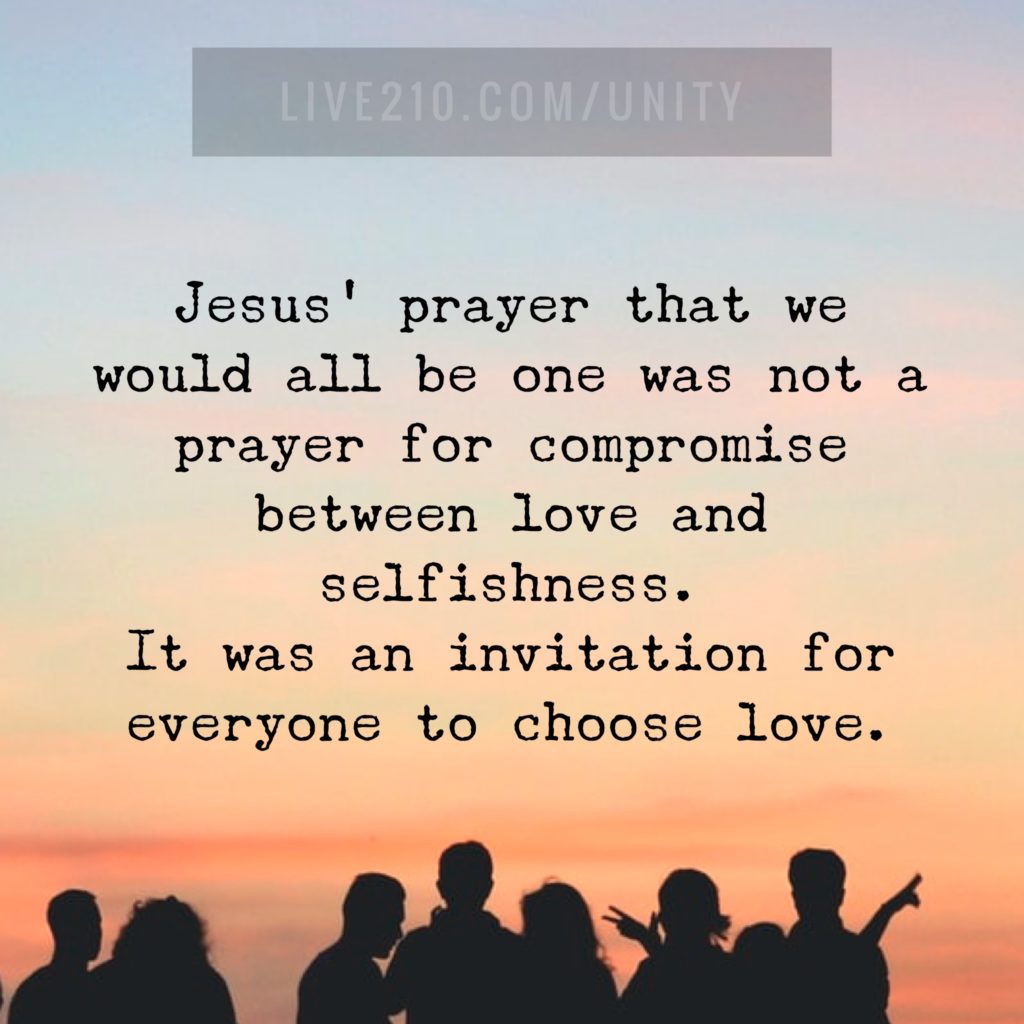9 min. to read.
I’ve not experienced a time that felt more divided. Pick the area of discourse, and people are forming camps, drawing lines of who is in and who is out, and naming the folks on the other side of the line as enemies. The emotional temperature seems to ping-pong between frustration and rage.
In this environment, you’re likely to hear a leader say something like this: “In this challenging time, what we need is unity. We need to come together.” If the speaker is a politician, they’ll say we need to “reach across the aisle.” If the speaker is a church leader, that person will admonish us to focus on where we agree. Everybody is certain: Unity is how we’ll move forward.
You’ve heard these messages, right? I know that unity is beautiful, but is it really how we move forward? Is unity the way of Jesus?
Short answer? No. Hold on. Give me a moment before you leave.
With certainty, I can say that the way of Jesus is love. If love is our way, we have to be clear: love doesn’t always mean unity. Not sure what I mean? Here’s the long answer.
When the Apostle Paul gave us that stunning working definition of love, he suggested ways love can be seen in our attitude. Love is patient and kind, not boastful, arrogant, or rude. It’s not self-seeking, irritable, or resentful. It bears all things, hopes, and perseveres. These are the practical out-workings of God’s love lived out in our relationships. Now consider how we use the word unity. It comes up when people have deep disagreements, and resolution isn’t simple. Often the call for unity goes out when emotions run hot and compromise seems less and less possible.
What does unity look like when one person thinks patience or kindness is the path forward, and the other person is impatient and rude? Is there a compromise between those? Is there a blend of kindness and rudeness that will be acceptable to both parties? Ridiculous.
Can there be unity with people who think the right ends justify any means, including lies, propaganda, threats, and even violence? Is there an acceptable middle ground on the amount of deception that’s reasonable or the amount of violence?
In the Beatitudes, Jesus told us that in the way of his new Kingdom, the blessed life comes to those who are weak, poor, and humble. Can those who are weak, poor, and humble live in fully mutual unity with those who maintain their wealth and power at the expense of others?
Paul told us that the Kingdom life would forever change how we see others. We would no longer justify hierarchy that separates and excludes people. In Christ, he wrote, there is no Jew nor Greek, no slave nor free, no male nor female. Paul didn’t mean that those human distinctions disappear, but that in the community of faith, we do not value people or devalue them on these terms. If we believe this, can we live in unity with those who cling to those hierarchies of power and exclusion? With those who say women should be silent and obedient? With white people who fundamentally believe that black people are less human? With those who declare any group of people to be animals worthy only of extermination? (I can’t believe just 78 years after the end of World War II, I have to write a sentence like that.)
In one teaching about final judgement, Jesus said the measure of our faith would be found in whether we sought him out among the poor, the hungry, the thirsty, those in need of clothes and shelter, those in prison. Can those of us obeying Jesus in these matters have unity with those who exploit people living on the margins of society?
If our fundamental ethic is love of neighbor, what is the limit on our willingness to compromise? We betray Jesus’ invitation when we surrender our call to love others by accepting quiet unity with those who want to exploit or injure our neighbor.

Avoiding discomfort has consequences.
I understand why we so long for unity. Most of us work hard to avoid discomfort. Many of us are desperate for others to like and agree with us. When painful and controversial topics arise, we’re tempted to avoid the conversation. Imagine having cancer and just wishing the doctor would pronounce us well and whole rather than going through the treatment. When we rush to alleviate social discomfort, we avoid the painful process of healing. We’ve done this for too long.
Just one example. During the Civil Rights movement of the 1960s, too many Christians didn’t want to rock the boat talking about the personal and systemic oppression of Black people. They were afraid to support the Civil Rights movement because of what their family, neighbors, or pastor would say. Sixty years later, we see the results of our failure to speak up. If you’re unhappy about the #BlackLivesMatter movement, consider this. There would be no need for BLM today if, at the invitation of Dr. Martin Luther King Jr., the majority of moderate American Christians had decided to confront the racism of Jim Crow, repented for complicity with slavery, and taken steps to repair this disastrous failure of our country.
There are many complicated and controversial conversations we’d rather avoid. Some of us are afraid to talk about how Christian Nationalism undermines our gospel witness. We don’t want to be called anti-American! Some of us don’t want to talk about how the Christian Purity Culture used shame as a weapon and wrecked thousands of lives and marriages along the way. We don’t want to talk about sex at all! (Umm… you understand how that’s purity culture, right?) Some of us don’t want to talk about how the Christian pro-life movement is usually just pro-birth and pro-control-of-women’s-bodies rather than genuinely committed to fostering life at every stage. We’re afraid someone might call us pro-abortion. We don’t want to talk about the obvious exploitation embedded in American capitalism; we don’t want anyone to call us Communist!
We hope that while we ignore the conversation, someone else will solve it. Sometimes, we even accuse those who bring the conversations up of being divisive! Yet, when the doctor tells us she’s found a tumor, she’s not divisive. She is telling us the painful truth for our good. She won’t ask us to ignore the problem or seek unity with our cancer. She will deliver the bad news so that we can take the steps that lead to life.
I’ve come to this conclusion: When people demand unity, they are either trying to manipulate us, or they are desperate to avoid their own discomfort. They may say we need to rise above and “agree to disagree,” but this is an illusory kind of unity that only serves to protect abusers and discourage truth-telling. I, too, want the feeling of unity again. I want to feel that we are all on the same team working toward the same goals together. I want this in the church. I want this in our country. But unity around sickness, violence, or deceit, is a cancer that will ultimately make our society and churches more and more sick.
If not unity, then what?
So, what do we do? I’m not proposing that we become inflexible and harsh, cutting off or abandoning those we disagree with (although I recommend leaving dangerous or toxic relationships). I understand that in both churches and democracy, compromise is necessary. When people who disagree on an end or the means to get there can hear one another and negotiate in good faith, the outcome won’t be perfect, but it still can serve the common good. This is not a call for single-issue stubbornness or summary exclusion of those we disagree with.
Our path forward is marked out by love, the guiding principle of the way of Jesus. We can speak and act in loving ways, even when we have to call out things in society or our churches that are sick. When we talk about our disagreements, we can be careful not to demonize those we disagree with. We can speak and act in good faith towards those who disagree with us. Even as we hold firm to our convictions, we can remain humbly open, considering that we don’t fully understand their position or experience. We can treat them with compassion. Love requires that the ends and the means align, so we move toward love in loving ways.
Don’t for a moment mistake this compassion for weakness. Some of those who demand unity, suggesting we should “agree to disagree,” will never be happy with us. We must remember that love also has boundaries. Love does not require that we violate our beliefs so others will approve of us.
If we find ourselves in an unresolvable disagreement with people in our lives, the final tool we have is to live our lives in such a way that our care, compassion, and sacrifice make the argument on our behalf. We may not be able to argue people into agreement, and it is not loving to try. But we can choose to live boldly from our values, trusting that if what we are doing is genuinely loving, it will be compelling to those who are open.
My people-pleasing self is afraid, knowing that people I love will not be happy with me. But I trust that as long as I pursue other-centered co-suffering love, my compass leads true.
As a follower of Jesus, I’m not seeking unity. Jesus’ prayer that his people would all be one was not a prayer for compromise between love and selfishness. It was an invitation that everyone would eventually choose the way of love. That kind of unity is real. It is the side-effect of people living other-centered co-suffering love.
Side note: Here’s a fascinating model that one church uses that ties love and unity together. Worth considering. 21st Century Church, Love & Unity

It seems like this could be message, not only for our current politics, but also what the United Methodist Church is going through. Some of us want to hang on to unity, but it’s become apparent it’s not possible.
I think you’re right, short of the Spirit changing hearts. I lived through a brutal and irreconcilable church split. Some in that church wanted to characterize the “splitters” as people who just wanted to go their own way, do their own thing, and were thus opposed to unity. But that wasn’t true for most. While it was complex and there were many issues involved, the heart of the issue came down to this. The people who eventually left were people who wanted the church to be more active in its mission to reach a wider group of people and to make those people welcome. The people who stayed didn’t want the demographic to change. In this case one group was motivated by love for others, and one group was motivated by comfort for self. How can there be unity between those? Unity could exist if both of these groups acted on other-centered co-suffering love, but they didn’t. Some in the group that left acted in love by essentially saying, “You don’t want to change. We won’t force you. We’ll go somewhere else.” much of the group that stayed refused to enter into other-centered co-suffering love. They “won” in the sense that they kept the church how they wanted it. Unity could have happened, but it would have required self-sacrifice.